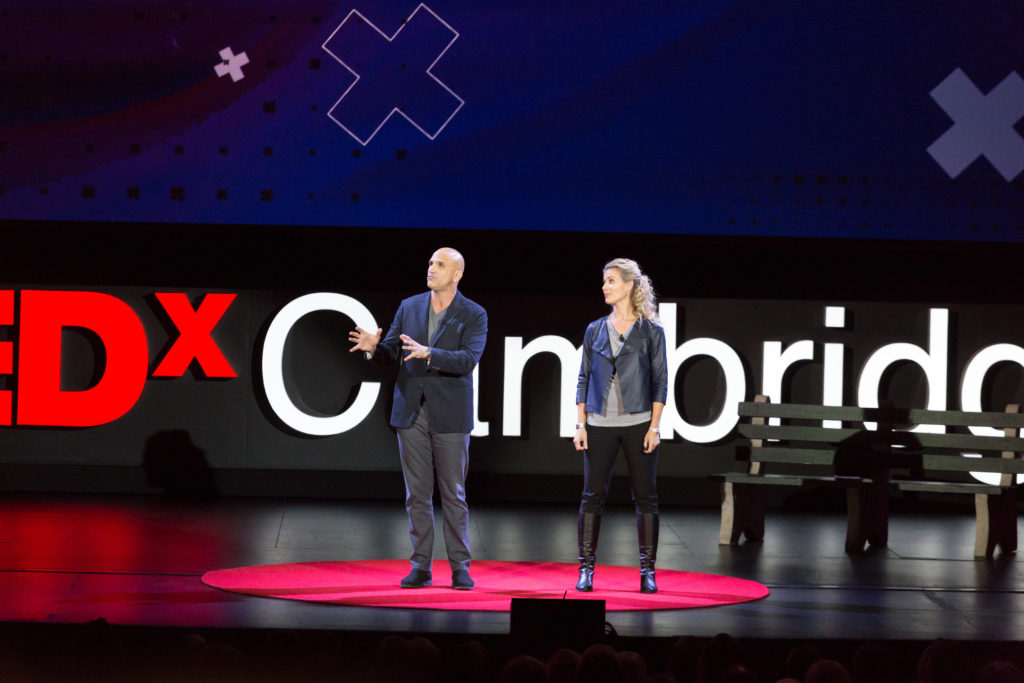Speakers break rules at TEDxCambridge
Michael and Amy Port, founders of Historic Public Speaking Worldwide, spoke about using acting techniques for real-life situations such as job interviews at TEDxCambridge Thursday. / Photo courtesy Bearwalk Cinema
October 18, 2017
Thousands attended TEDxCambridge Thursday, filing past an exhibition of new Tesla cars and spherical cargo-carrying robots named Gita.
Inside, six speakers promoted five new ideas, ranging from breakthroughs in Alzheimer’s research to bringing music opportunities to youth in underprivileged communities. The event was emceed by its executive producer, Tamsen Webster.
Webster said although her team avoids assigning themes to each event, as they prepared with the speakers, she realized a theme emerged anyway — breaking the rules. Each speaker addressed that idea in a different way, and she challenged the audience to find the rule-breaking aspects of each one.
The TEDx organizers bent some “rules” themselves, Webster said, as the Cambridge event was actually held on the opposite side of the Charles River in the Boston Opera House.
When Michael and Amy Port began their joint talk, they ignored the audience and pretended to have a conversation between themselves. Using a bench as a prop, the couple discussed the techniques of acting and how they can be applied to real life. Michael, a graduate of The Yale School of Drama, and Amy, who attended New York University’s Tisch School of the Arts, insisted what they learned at school could help anyone.
The Ports founded Heroic Public Speaking Worldwide to teach people with fears of public speaking how to use acting techniques to improve their lives — not a typical approach to life-coaching.
“Actors use techniques on the stage to create a believable reality,” Michael Port said in the speech. “Non-actors can use the same techniques to create the reality they choose.”
Amy Port explained that many people find acting inauthentic — actors, on a stage, pretending to be someone else. But she said regular life is also a stage for performance, just like William Shakespeare once said: all the world’s a stage.
“Performance is not fake behavior,” Amy Port said. “Good performance is genuine behavior in a manufactured environment.”
Four speakers hailed from the Boston area, while the Ports came from New York. Gita, the robot brainchild of Piaggio Fast Forward CEO Jeffrey Schnapp, is also being developed in Boston. The wheeled contraption follows its owner around, carrying belongings such as groceries or laundry.
Rosie Kotelova, a designer on the Gita project who was testing it with attendees, said she loves how Gita is different than most mainstream robots. She said developers hope it will persuade people to walk, instead of drive, to do their errands and other daily tasks.
“It’s being able to create a product that’s changing how people live,” Kotelova said. “Most of the press you hear about robots is that they’re taking away jobs and making people lazy, but we’re doing the opposite — making people more active.”
Another speaker, Mike Boston, also focused on creating something completely new. A Dorchester native, Boston grew up amid gang activity in a neighborhood often ignored by the rest of the city. After becoming involved with music and rapping, he created Mobile Stu, a recording studio that operates out of a pick-up truck, more than a decade ago.
“We need to create more unbridled creative opportunities,” Boston said in his presentation. “If drug dealing continues to be the prime industry on the streets, not much will change. It’s on us to let go of the stereotypes and the filters that prevent us from seeing these people as people.”
Boston was featured on The Ellen DeGeneres Show in April, when DeGeneres provided him with a new car to help him continue recording. He said his main focus is showing underprivileged kids that there are people who will listen to them.
“In cities where I’m from, why do people feel like they don’t have a voice?” Boston said. “The current platforms are flawed.”
Young people were also instrumental in operating the event, and many volunteers came from universities in Boston. Erika Yi, a third-year behavior and health major at Boston University, worked as an usher in the lobby after finding the application on Facebook.
“The people here have accomplished so much,” Yi said. “Not just the speakers, but the people who attend. I like hearing about their lives after college.”
The other three speakers discussed their academic pursuits and new research. Tsedal Neeley, a professor of organizational behavior at Harvard Business School, spoke about her research into how language impacts culture. The research was largely based on the Japanese company Rakuten that established an English-language mandate in 2010. Glenn Cohen, a bioethics expert, explained the difference between “human” and “person,” exploring the concept of personhood versus biological identity. Lastly, Dheeraj Roy, a neuroscientist at the Massachusetts Institute of Technology, presented his discovery that Alzheimer’s may not cause the brain to lose memories, but instead forget how to find them.
There were several college students in attendance from the Boston area. Deepali Sastry, a first-year at Brandeis University, attended this year after organizing TEDx events at her high school in Palo Alto, California.
“It was great to see it in a more professional setting,” she said. “TED always does a really good job of bringing in people of different backgrounds.”
The event closed with a performance from Phunk Phenomenon, a dance troupe which strives to bring education and entertainment to inner city children and teens. The group, made up of several different age groups, focuses primarily on hip-hop.
First-year Brandeis student Pallavi Goel said she especially enjoyed Neeley’s talk on the relationships between culture and language.
“It was a really great analysis of how to make society more global,” Goel said. “The dance at the end was really just a cherry on top.”







